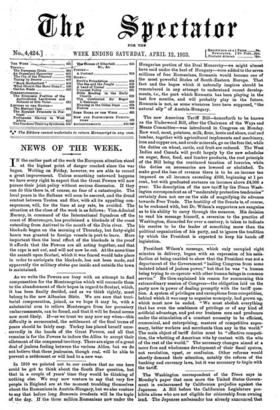The new American Tariff Bill—henceforth to be known as the
Underwood Bill, after the Chairman of the Ways and Means Committee—was introduced in Congress on Monday. Raw wool, meat, potatoes, milk, flour, boots and shoes, coal and lumber, together with agricultural implements and machinery, iron and copper ore, and crude minerals, go on the free list, while the duties on wheat, cattle, and fruit are reduced. The West , Indies and Canada will profit largely by the new schedules on sugar, flour, food, and lumber products, the root principle of the Bill being the continued taxation of luxuries, while the duties on necessaries are lowered or abolished. To make good the loss of revenue there is to be an income tax imposed on all incomes exceeding 2800, beginning at 1 pet cent, but with graduated surtaxes on incomes above 24,000 a year. The description of the new tariff by the Times Wash- ington correspondent as of "moderately protective tendencies" certainly does not err on the side of magnifying its advance towards Free Trade. The hostility of the Senate is, of course, to be reckoned with, but Dr. Wilson's supporters are sanguine as to his ability to carry through the measure. His decision to read his message himself, a reversion to the practice of Washington, discarded for over a century, is taken to indicate his resolve to be the leader of something more than the political organization of his party, and to ignore the tradition by which the President is expected to keep his hands off legislation.










































